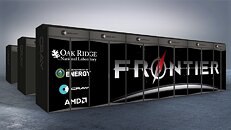During this year's Supercomputing Conference 2021 (SC21), AMD is showcasing its expanded presence and growing preference in the high performance computing (HPC) industry with the exceptional innovation and adoption of AMD data center processors and accelerators. Customers across the industry continue to expand their use of AMD EPYC processors and AMD Instinct accelerators to power cutting-edge research needed to address some of the world's biggest challenges in climate, life sciences, medicine, and more.
Growing preference for AMD is showcased in the latest Top500 list. AMD now powers 73 supercomputers, compared to 21 in the November 2020 list, a more than 3x year-over-year increase. Additionally, AMD powers four out of the top ten most powerful supercomputers in the world, as well as the most powerful supercomputer in EMEA. Finally, AMD EPYC 7003 series processors, which launched eight months ago, are utilized by 17 of the 75 AMD powered supercomputers in the list, demonstrating the rapid adoption of the latest generation of EPYC processors.


Expanding Customer Base
AMD is engaged broadly across the HPC industry to deliver the performance and efficiency of AMD EPYC and AMD Instinct products, along with the ROCm open ecosystem, to speed research. Through high-profile installations like the ongoing deployment of Oak Ridge National Laboratory's "Frontier" supercomputer, AMD is bringing the compute technologies and performance needed to support developments in current and future research across the world. Highlights of "Frontier" and other new HPC systems in the industry include:
A Year of Breakthrough Products and Research
This year AMD launched its AMD EPYC 7003 series processor, the world's highest-performing server processor. Since then, there has been overwhelming adoption from partners across the industry who are driving discoveries in biomedicine, predicting natural disasters, clean energy, semiconductors, microelectronics and more.
Expanding on the features of the EPYC 7003 series processor, AMD recently previewed the 3rd Gen EPYC processor with AMD 3D V-cache. By utilizing innovative packaging technology, which layers the L3 cache in EPYC 7003 series processors, AMD 3D V-Cache technology offers enhanced performance for the technical computing workloads prevalent in HPC. Microsoft Azure HPC virtual machines featuring 3rd Gen EPYC with AMD 3D V-Cache are currently available in Private Preview and will be available globally soon.
AMD also unveiled the world's fastest HPC and AI accelerator, AMD Instinct MI250X. Designed with the AMD CDNA 2 architecture, the AMD Instinct MI200 series accelerators deliver up to 4.9x the peak FP64 performance versus competitive data center accelerators, which is critical for HPC applications like weather modeling. The AMD Instinct MI200 series accelerators are also the first to have over 100 GB high-bandwidth memory capacity, delivering up to 3.2 terabytes per second, the industry's best aggregate bandwidth.
View at TechPowerUp Main Site
Growing preference for AMD is showcased in the latest Top500 list. AMD now powers 73 supercomputers, compared to 21 in the November 2020 list, a more than 3x year-over-year increase. Additionally, AMD powers four out of the top ten most powerful supercomputers in the world, as well as the most powerful supercomputer in EMEA. Finally, AMD EPYC 7003 series processors, which launched eight months ago, are utilized by 17 of the 75 AMD powered supercomputers in the list, demonstrating the rapid adoption of the latest generation of EPYC processors.


Expanding Customer Base
AMD is engaged broadly across the HPC industry to deliver the performance and efficiency of AMD EPYC and AMD Instinct products, along with the ROCm open ecosystem, to speed research. Through high-profile installations like the ongoing deployment of Oak Ridge National Laboratory's "Frontier" supercomputer, AMD is bringing the compute technologies and performance needed to support developments in current and future research across the world. Highlights of "Frontier" and other new HPC systems in the industry include:
- "Adastra," an HPE supercomputer that will have two partitions powered by AMD CPUs and accelerators, was recently announced by GENCI, the French national agency for HPC, and CINES, the National Computing Center for Higher Education. The first partition is based on next-generation AMD EPYC processors code named "Genoa" and the second partition is based on 3rd Gen AMD EPYC processors and AMD Instinct MI250x accelerators.
- Argonne National Laboratory's "Polaris" testbed supercomputer, powered by AMD EPYC 7003 series processors, enabling scientists and developers to tackle a range of artificial intelligence (AI), engineering and scientific projects.
- A new supercomputer built by HPE using AMD EPYC CPUs to advance weather forecasting and climate research for the National Center of Meteorology in the United Arab Emirates. HPE also updated Eni's supercomputer to accelerate the discovery of energy sources using AMD EPYC processors.
- Oak Ridge National Laboratory's "Frontier" exascale computer - which is powered by optimized 3rd Gen AMD EPYC processors and AMD Instinct MI250x accelerators.
- The Texas Advanced Computing Center at The University of Texas at Austin launched Lonestar6, a Dell Technologies supercomputer powered by AMD EPYC 7003 series processors.
- University of Vermont's Advanced Computing Core, powered by AMD EPYC processors and AMD Instinct accelerators, driving research into COVID-19 and solutions to future potential threats to global health.
- Washington University's advanced clustering technologies, powered by AMD EPYC processors, studying COVID-19 and home to the Folding@home project.
A Year of Breakthrough Products and Research
This year AMD launched its AMD EPYC 7003 series processor, the world's highest-performing server processor. Since then, there has been overwhelming adoption from partners across the industry who are driving discoveries in biomedicine, predicting natural disasters, clean energy, semiconductors, microelectronics and more.
Expanding on the features of the EPYC 7003 series processor, AMD recently previewed the 3rd Gen EPYC processor with AMD 3D V-cache. By utilizing innovative packaging technology, which layers the L3 cache in EPYC 7003 series processors, AMD 3D V-Cache technology offers enhanced performance for the technical computing workloads prevalent in HPC. Microsoft Azure HPC virtual machines featuring 3rd Gen EPYC with AMD 3D V-Cache are currently available in Private Preview and will be available globally soon.
AMD also unveiled the world's fastest HPC and AI accelerator, AMD Instinct MI250X. Designed with the AMD CDNA 2 architecture, the AMD Instinct MI200 series accelerators deliver up to 4.9x the peak FP64 performance versus competitive data center accelerators, which is critical for HPC applications like weather modeling. The AMD Instinct MI200 series accelerators are also the first to have over 100 GB high-bandwidth memory capacity, delivering up to 3.2 terabytes per second, the industry's best aggregate bandwidth.
View at TechPowerUp Main Site

